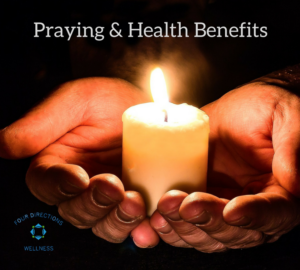If you have ever been faced with a life-threatening illness or visited your local hospital when a loved one is receiving care, chances are you have entered into a moment in silence for yourself or a loved one. And you are not alone. An estimated 85% of us confronting a major illness prayed when we received the news, states a University of Rochester study. Praying offers a way of connecting with something larger than us and offers many a “sense of greater clarity, purpose, gratitude, presence, sense of connection and overall well-being,” states an article by Dr. Colbert titled “The Stunning Science Behind the Healing Power of Prayer.”
The Relaxation Response:

Does Prayer Help or Harm Our Health?
Prayer is not the only approach utilized when facing a health concern. Many with a spiritual leaning also use meditation to gain their inner strength. What, then, is the difference between prayer and meditation? In many spiritual practices, prayer is thought of as the opportunity for a person to confide in his or her Higher Power while meditation offers an opportunity for something greater than us to provide messaging back.
Whether you use prayer or meditation, those in the medical field see both options having an impact on your physical health. It is explained as the person tapping into his or her “relaxation response.” If you remember your biology class back in high school, you might remember the discussion on the autonomic nervous system (ANS). Your ANS is divided between your parasympathetic (rest and digest) and your sympathetic (fight or flight). When you hear that you or a loved one is facing a health concern, it may trigger the “fight or flight response.” Your body tenses up and leaves the person or their loved one unable to relax. A relaxed state allows the physical body to enter a state of homeostasis, or balance so that the body may heal more easily.
Prayer Research:
The inclusion of prayer and meditation within our healthcare system has varied throughout time but there is now growing interest in the field. In the past, a hospital might have a chaplain and a room dedicated for spiritual reflection. Now more healthcare providers are actually seeing the actual health benefits. Hospice providers have always known the importance of our spiritual beliefs. When a person is on hospice services, the person’s whole being is considered. The hospice team works as much on the person’s spiritual and emotional needs as his or her physical needs. The success of the hospice program and other similar medical approaches incorporating spiritual practices has many providers asking why we wait until the end of life to incorporate into the person’s overall wellbeing.
Research is indicating that spiritual considerations should be incorporated earlier in a person’s overall healthcare. Here are some examples provided in a recent Huffington Post blog titled “Why People Who Pray are Healthier than Those Who Don’t.”
- National Institutes of Health Study: Found individuals who prayed daily were 40% less likely to have high blood pressure than those without regular prayer practice;
- Dartmouth Medical School: Found that patients with strong religious beliefs who underwent elective heart surgery were three times more likely to recover than those who were less religious;
- University of Cincinnati: Found that inner city youth with asthma who used prayer and meditation experienced fewer and less severe symptoms than their non-praying counterparts, and
- Journal of Gerontology: Found that 4,000 senior citizens in Durham, North Caroline who prayed or meditated coped better with illness and lived longer than those who did not.
With all of the research available, no research found any harmful consequences to a person’s health when prayer or meditation was incorporated.
What are your thoughts? I would love to hear what you think about prayer, meditation and its incorporation into our healthcare system.